Not so much a recipe, just my lunch. 🙂 A toasted mini-bagel with a scrambled egg, seeni sambol, and some avocado (with a bit of salt and pepper). Yum.

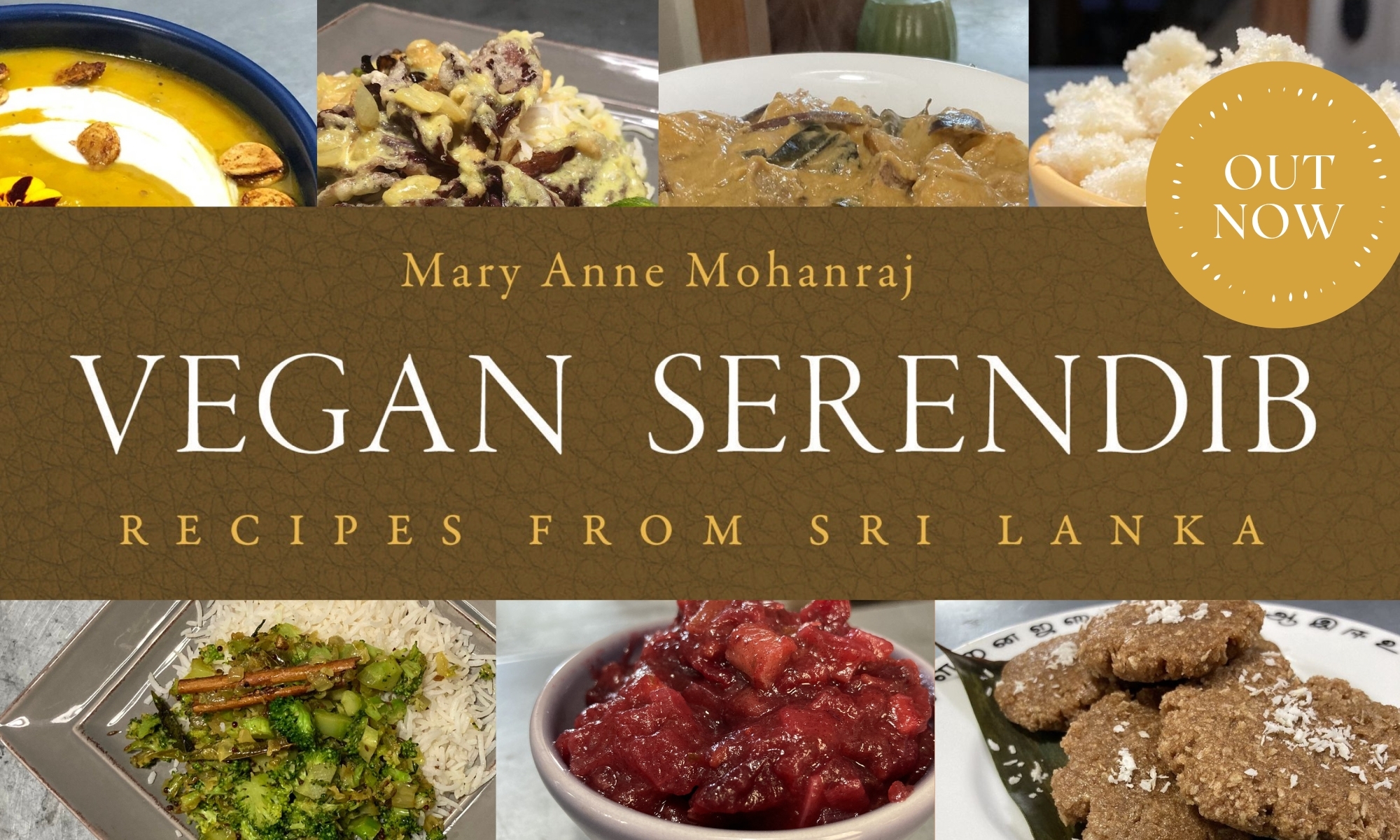
with Mary Anne Mohanraj
Not so much a recipe, just my lunch. 🙂 A toasted mini-bagel with a scrambled egg, seeni sambol, and some avocado (with a bit of salt and pepper). Yum.

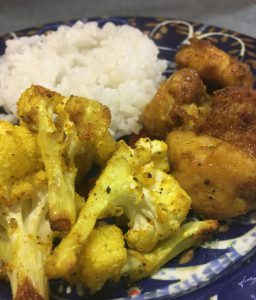 (30 minutes, serves 4)
(30 minutes, serves 4)
The goal for this dinner was to make the spicing very simple, make something the kids would happily eat, and have it all ready in thirty minutes, for an easy weeknight meal. Success on all counts!
The flavors are honestly a little too similar for what I’d consider ideal — normally, I’d cook either the chicken or the cauliflower, and serve it with a contrasting curry. But when you’re tired and want dinner on the table quick, this’ll do nicely. If you have the energy to chop up some cucumbers and tomatoes, they’d add a nice crunch and contrast. You could stir them into a bit of yogurt for creaminess too.
1 lb. boneless, skinless chicken thighs
1 head cauliflower
1 c. white rice
2 t. onion powder
2 t. ground ginger
2 t. garlic powder
2 t. salt + a pinch
2 t. turmeric
2 t. pepper
vegetable oil for frying & roasting (about 1/2 c.)
1. Pre-heat oven to 400. Cut chicken into bite-size pieces, mix with 1 t. each of the spices, set aside in a bowl.
2. Cut cauliflower into bite-size pieces, mix with 1 t. each of the spices, along with 1/4 c. of vegetable oil. Spread on a foil-lined baking tray and put in oven to roast. Set timer for 20 minutes (or 25 if you prefer them entirely soft).

3. Start rice: Add 1 c. rice to 2 c. water, with a pinch of salt, in a sauce pan. Turn to high.
4. In a frying pan, add remaining oil and heat on high for a few minutes. When the rice starts bubbling, turn to simmer and cover. (Set a timer for 15 minutes.)
5. Add chicken to frying pan and brown nicely on high, stirring occasionally. When it’s browned well, turn heat down to medium and continue stirring for another 3-5 minutes, until chicken pieces are cooked through. Drain excess oil. (I do this by setting the pan on a tilt on the edge of the stove, scooting the chicken up to the higher edge. Leave it alone for a few minutes, so the oil collects, then use a paper towel to sop up the excess oil, and dispose of the paper towel.)

6. When the timer goes off for the rice, give it a stir, and then leave it for a few more minutes to finish cooking. (My friend Kat and I disagree about this — she thinks my rice is undercooked this way, but it seems perfect to me. Your mileage may vary — you can leave it to sit covered another 5-10 minutes if you like.)
When the timer goes off for the cauliflower, serve with rice and chicken, hot.
(30 minutes, serves four)
 It is honestly still a little bewildering to me, growing up in a Sri Lankan tradition, that one can make quite tasty food without chopping several onions and utilizing a host of spices. But I have to admit, on a weeknight when you want to cook fast and get back to catching up on Doctor Who, it’s nice to have the option. This dinner uses only steak, broccoli, potatoes, olive oil, salt, and pepper. That’s it! Yup, still bewildering.
It is honestly still a little bewildering to me, growing up in a Sri Lankan tradition, that one can make quite tasty food without chopping several onions and utilizing a host of spices. But I have to admit, on a weeknight when you want to cook fast and get back to catching up on Doctor Who, it’s nice to have the option. This dinner uses only steak, broccoli, potatoes, olive oil, salt, and pepper. That’s it! Yup, still bewildering.
Note: You’ll have enough time to make 2 lbs. of flank steak, which gives you enough for sandwiches or salad at lunch the next day. But you can just make 1 lb. if you prefer.
2 lbs. flank steak
4 Yukon Gold potatoes
1/2 lb. broccoli
olive oil as needed (about 1/2 c. total)
salt and pepper to taste
1. Preheat oven to 350. Cube potatoes, toss in a little olive oil, salt and pepper, transfer to a foil-covered baking sheet, and start in oven. Set timer for 15 minutes.
2. Cut up broccoli into bite-size pieces (stems and heads both), toss in olive oil, salt, and pepper, and set aside.
3. Cut flank steak in half (so it will fit in grill pan or frying pan). Start pan heating on high (it’ll give off a fair bit of smoke while cooking, so a strong vent fan is helpful here). Spread some olive oil, salt, and pepper on both sides of the two pieces of steak. When pan is hot, add one piece to pan.
4. For medium rare, cook four minutes on one side, then flip over, and cook three minutes on the other side. Somewhere in here, your timer will go off. Pull out the potatoes, and add the broccoli to the roasting pan; I like to put them evenly around the edge, piling up the potatoes a bit if needed. Put back in the oven for another 15 minutes.
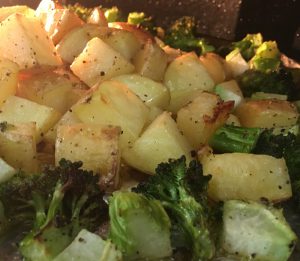
5. Take the first piece of steak to a plate to rest; it’ll give off some juices (which we usually pour off and add to our grateful dog’s dinner) over the next few minutes. Start the second piece of steak going — again, four minutes on one side, three minutes on the other.
6. Pull the second piece off to rest; by now, the potatoes and broccoli should be finishing up, lovely and golden and crispy, beautifully sweet on the insides. Slice the first steak thinly against the grain, and serve hot with vegetables and perhaps a nice dry shiraz for the grown-ups.
(30 minutes, serves 4)
 New year, new eating plan. Our kids are eight and ten, and we’re trying to eat a little healthier all around, and hopefully get them to eat more of the same foods we do; we’ve spent too long making separate meals. All of us could stand to rely a little less on packaged meals and easy carbs. So we’re trying to do some joint family meal planning, which is challenging because I have to give up a little control. I love control.
New year, new eating plan. Our kids are eight and ten, and we’re trying to eat a little healthier all around, and hopefully get them to eat more of the same foods we do; we’ve spent too long making separate meals. All of us could stand to rely a little less on packaged meals and easy carbs. So we’re trying to do some joint family meal planning, which is challenging because I have to give up a little control. I love control.
But that said, it’s also a good way to get me out of my default curry-all-the-time rut. I used to cook lots of other things. 🙂 Tonight, we went Italian, with plenty of protein and vegetable, a little pasta to fill things out, and not stinting on the butter and Parmesan, salt and pepper. I was aiming for an easy weeknight meal, taking no more than thirty minutes to cook.
The trickiest part about this, I think, is sequencing it so that you’re never really pausing, but you’re also not hurrying, and it’s all done at about the same time. If you’re more of a new cook, this will probably take a little longer, until you get the hang of moving smoothly from task to task.
1 lb. asparagus
1-2 T olive oil for asaragus, plus 1-2 T olive oil for chicken
one onion
three cloves garlic
1 lb. boneless, skinless chicken thighs (you can use breast if you’d prefer)
4-8 oz. penne
1 T butter (optional)
Parmesan for grating
salt and pepper to taste
1. Start oven (I use the toaster oven for this) heating to 350. Break ends off asparagus (at natural snapping point) and discard; toss asparagus spears with 1-2 T olive oil, salt (about 1/2 t.) and pepper (ditto). Spread on foil on a baking pan, and put in oven for about 20 minutes. (Set timer!)
2. Set a pot of water boiling for pasta.
3. Slice onion thinly, start sautéing in a large frying pan with 1-2 T olive oil. Turn heat down to medium, so you don’t need to watch it like a hawk. Chop three cloves garlic, stir them in.

4. Cut chicken into bite-size pieces, stir them in. Season with salt (about 1/2 t.) and pepper (ditto). Turn heat up to high for a bit, so the chicken will sear; cook, stirring. Then you can turn it back to medium or even low if you like, and let it keep cooking, stirring occasionally. If it seems a little dry, add a T of butter at this point.
5. By now, your water should be boiling. Add penne, stir, and set timer for 10 minutes. Check on the asparagus; it should have a few more minutes to go. Stir the chicken. Pour yourself a glass of white wine, if you’d like. Pour a little into the pan, if you like.

6. When the asparagus timer goes off, remove it from the oven. Eat a few spears right then, because they are at their most delicious like this. Try to save most of them for the children. Transfer to a cutting board, and cut into bite-size pieces. Add asparagus to the chicken in the pan, stirring to combine.
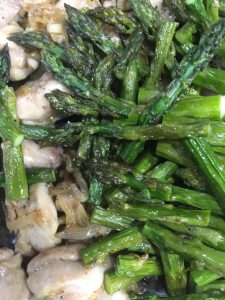
7. When the pasta timer goes off, drain the pasta. Add it to the chicken and asparagus, stirring to combine. Taste and add salt and pepper if desired (though not too much salt, as the Parmesan is also salty.)

Serve hot, with fresh Parmesan to grate over. Yum.
NOTE: If you have picky eater suspicious of bits of onion / garlic, you can just toss the chicken in 1 t. each of onion and garlic powders before sautéing. You can also serve the asparagus on the side, instead of cutting it up and mixing it in. And finally, if you happen to have cherry tomatoes on hand, cutting them in half and stirring them in at the very end would not be a terrible idea. I was sadly out of them, or I would have!
I was not a very good cook in college. I’d called my mother, somewhat desperate after months of dorm cafeteria food, and she taught me how to make her beef and potato curry over the phone. I made it regularly, sometimes eating with bread, sometimes with rice. I thought I had it down.
Then one day, I set a pot of rice going on the stove. Brought it to a boil, turned it down to a simmer. And then I just…wandered off. I must have gotten caught up in some interesting conversation; I’d like to think that I was arguing about Wittgenstein, because that makes what actually happened sound slightly less ridiculous.
No, it doesn’t.
Some endless time later, the fire alarm went off. The entire dorm, all twelve floors, were evacuated, and I went with them, carrying a horrible pit of certainty in my stomach. About six hundred and fifty students stood outside in the cold, until the fire department finally let us back in. That’s when I discovered what had happened to my rice — our suite was full of smoke, and my rice had cooked so long and so dry that it had turned into something that looked a lot like lava. I didn’t know rice could do that.
Jump forward twenty-five years. Last night, on New Year’s Eve, I made stock. I even wrote a nice, long metaphorical post about it, cooking the bones of the old year to bring in the new. Etc. and so on. I’m a good cook these days, a very good cook, I even have a cookbook, and am hoping to publish a second soon. I’d come a long way from the girl who burned rice.
So you can imagine how I felt when I turned my stock into chicken soup today, with a house full of guests for New Year’s, and went to taste the soup, and realized that it just smelled — wrong. Off. Possibly the sort of thing that would give my guests food poisoning. They were good friends and it was a casual potluck gathering, thankfully, but still, it was embarrassing. I’d promised them soup, but I couldn’t possibly serve it to them. We pulled some frozen pierogies out and sautéed them, and later, after they’d all left, I had Kevin pour the failed soup down the sink. I couldn’t bear to do it myself.
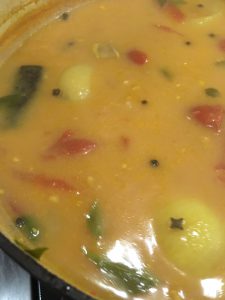
I still don’t really know what went wrong; I suspect the bones I used for the stock had just sat in the freezer too long. Sometimes, even after what ought to be plenty of practice, you just get it wrong. It seemed like a good idea when you started, but somewhere along the way, that project turned down a dark path.
For New Year’s Day, I wanted to start the year out right. Doing a little bit of everything I hoped for in the new year — cooking and gardening, writing and exercise. Spending time with friends and family. Making art.
I pulled out all my UFOs — for those of you who don’t knit or crochet, that’s what we call ‘unfinished objects.’ I can’t stand to have too many of them; it’s like being in the middle of reading (or writing) too many books. I start to get confused and stressed out — 3 to 4 is about my limit. There were four this time, some of which had been languishing for months. I made myself a promise — I would work a row on each one, and if it wasn’t fun, if it wasn’t right, I would give up on the project and let it go.
I am terrible at letting things go. Ideas, projects, people. I am acquisitive; I like to accrete. I am basically a crow in human form — if I see a shiny pretty, I want it. But time is limited, space and energy ditto. Sometimes, these things, they’re just weighing you down.
Three projects survived the winnowing — I crocheted another row on the Christmas afghan, and a flower for my daughter’s spring scarf. I knit a row of the colorwork armwarmer I had designed — my first such design. While I was cursing the artistic impulse that had led me to work with three colors instead of two — exponentially harder! — I still felt delight as I watched the pattern emerge from the twisting strands. It was worth the time I spent detangling.

And the last project? It gave me no joy when I picked it up; it looked wrong, and sad. Recycled sari fabric, turned into yarn, that I had tried in one project after another, but none of them seemed right for it. I ripped it back — we call it frogging when you do that with crochet, because you’re going rip it, rip it, rip it — yes, textile folks are hilarious. I made it into a beautiful ball of potential again, and then I gave that ball away to a friend, who would make better use of it than I could. I felt lighter for letting it go.
This is the time of year when so many people are making resolutions, reassessing their lives, trying to do more, be better versions of themselves. I think that must have been happening since the dawn of humanity. Deep in the heart of winter, in the cave, one caveman turned to another and said, “This year, I’m going to master that fire thing. You’ll see.”
Maybe it’s also the time to be gentle with ourselves. To look at everything we’ve taken on, to see that some things just didn’t work out. We made mistakes, weren’t paying attention, made the wrong choices from the beginning. Time to reassess, let those projects go. Maybe there’s a little too much on that plate.
Pour the failed soup down the sink. It’ll be okay.
If we still want soup tomorrow, we can make more.
“But why are you making stock?”
It was a fair question — Kevin had asked what I planned to do today, on New Year’s Eve, and I said, ‘make stock,’ and that was confusing because while we cook with stock all the time, we generally just buy it ready-made.

But it made sense to me — I was recovering from a winter sickness, craving soup, and supposedly making stock the old-fashioned way, with all the bones in, actually was good for your immune system, or so I’d read somewhere, at some point. And more than that, it felt right for New Year’s Eve, to head into the next year using up the bones of the old, making something good and fresh and strong for going on with.
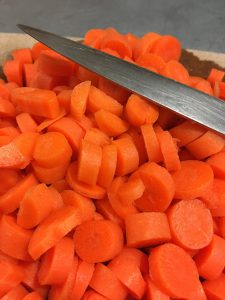
It was going to be a slightly unusual stock, because our grocery delivery had failed to materialize, so no celery, and no wings I’d ordered to supplement the chicken breast I had on hand in the freezer. But it turned out that a friend had stored a turkey neck in our freezer (long story), so once she gave us her blessing, that joined the chicken breasts in the pot. I never liked celery anyway, so even though it’s classic for stock, I was pretty sure I could get along without it.
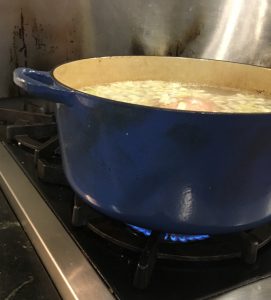
I cleaned the kitchen too, with Kevin lending me a hand when I got tired, because in my family, it’s traditional to start the New Year with a clean house. I didn’t quite manage the clean house (sorry, Amma), but a clean kitchen is the most important part, I think. Heart of the home.

And now the stock is simmering, and Kevin and I have poured out glasses of the 25-year-old vintage port that he got us for our 25th anniversary — which was several months ago, but we were having a party then, and it was a little busy, so we’ve only gotten around to opening it now. It is tasty.
He’s putting the children to bed, and then we will curl up in bed ourselves and watch The Marvelous Mrs. Maisel with our port and chocolate cupcakes. In an hour and a half or so, the stock will be simmered sufficiently; I’ll chill it overnight in the fridge, and then skim off the fat and scum from the top in the morning, so it’ll be all ready for soup experiments, or whatever else the new year brings us.
Wishing you a good skimmer for ridding yourself of last year’s scum.
More importantly, wishing you plenty of rich, hearty soup — or whatever else you find nutritious and sustaining and delicious — to carry you through the new year.
That feeling when you have an upset stomach and nothing sounds good except maybe something tangy, and you remember that your mother used to make and drink rasam, a spicy-sour tamarind soup, that was actually supposed to be good for an upset (sour) stomach, and as a kid you didn’t like it, but your tastes have evolved and now it sounds really good.
So you somewhat pathetically ask your husband if he can make you some, and he looks startled because he’s never heard of or tasted this before, but dubiously says okay, if you give him the recipe, so you message him a recipe you found online, and then there’s some back and forth because the recipe isn’t actually that clear, but you get to what you think it is eventually, and he heads back down to start it simmering
And a friend sends her kid across the alley with tamarind because you’re inexplicably out (although it turns out that there was some, hiding behind the lentils), and then the husband brings it to you, along with the rice (because some people like to sip it straight up and some people like it with rice and you aren’t sure which kind of people you are), and it is delicious and you finish it all.
I am not sure whether it will actually make my tummy feel better, but it is very nice to be cosseted once in a while.
(And extra thanks to Anand for putting off his promised Terraria game so that Daddy could make Mommy soup.)
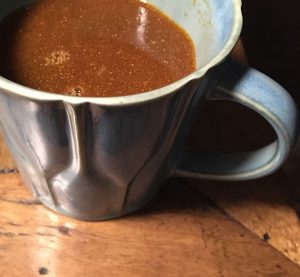
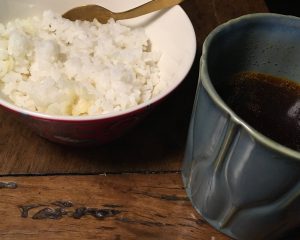
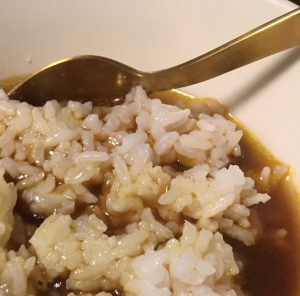
I have a friend whose daughter is allergic to eggs, which led me to wonder about the classic egg wash, used to add lovely color to breads. I did a little research, and learned that you can do a wash with egg whites only, with heavy cream, even just with milk (done when funds are tight).
In this first photo, the curry buns on the left were baked with no wash at all; the ones on the right with a traditional egg wash. Interestingly, the bottom left one did brown a little, but certainly you got a more consistent, richer result from the egg wash.
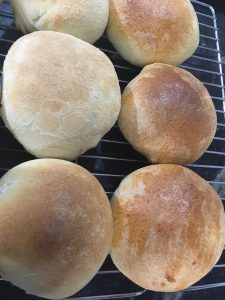
Then I tried using just whites, and just heavy cream. The whites browned almost as well as the traditional egg wash; the heavy cream gave a little color, but I’m not sure it’s enough that I’d bother with it, honestly.

No real conclusions here — but it was fun experimenting!
My in-laws have been visiting for a few days, so we’ve been cooking for a larger array of palates than usual. Holiday cooking for a large group is a little like being on a game show — can you feed all of these people in a way that makes everyone happy? Can you do it for three meals in a row? How about for three days in a row? (They did go out for brunch yesterday, which helped!)
It’s already somewhat challenging cooking for just me, Kevin, and the kids — Kev and I both love spicy food, but he doesn’t eat mushrooms (sad) or fish (tragic). The kids mostly don’t eat spicy food, though we’re working on that, and their appreciation for vegetables is still fairly limited (but improving). With the addition of the relatives came more restrictions — my mother-in-law doesn’t like beets or cilantro (but my father-in-law does), my sister-in-law doesn’t do spicy, and her daughters aren’t big fans of spicy either. Etc. and so on.
All of which means that we could just stick to mac-and-cheese to feed everyone, but after three days of that, I just can’t take it anymore. I like pasta as much as the next person, but before too long, I start to crave South Asian food. So last night, we did our best to cook South Asian food that everyone would eat.
Having several dishes meant that we could expect people to skip one or two and still have plenty to eat. I left out the chili powder on the ginger-garlic chicken, and that went well; I left out the mustard and cumin seeds on the vegetables, because I wasn’t sure the kids wouldn’t find them suspicious, and I used onion powder instead of onions, because various people don’t like pieces of onion. We just put one jalapeño in the cabbage, instead of three Thai green chilies, and we reduced the chilies in the beets similarly. And I made a cucumber raita, just in case it was still too spicy!
I wouldn’t say it was a complete success — despite my children’s urgings that the chicken was really good, their cousins refused to try it! But I think the adults were mostly fine, at least, and everyone was fed sufficiently, and I got a little of the food I love and need — the flavors were milder than normal, but still in the right continent, at least. Good enough!





I had never heard of crack seed, but when Jed saw the sign for the Crack Seed Store, he guided me inside, to a wonderland of Chinese snacks.

“Crack seed is a category of snacks that originated in China. It is highly popular in many regions, such as Hawaii. Crack seed are basically preserved fruits that have been cracked or split with the seed or kernel partially exposed as a flavor enhancement. This type of snack is commonly referred to in Chinese language as see mui (西梅; [siː muːi]); it arrived in Hawaii during the 19th century, when Cantonese immigrants were brought to work on the plantations.

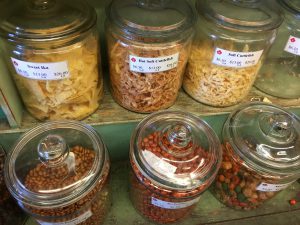
The flavors are varied, ranging from extremely sweet and salty to sour flavors. Flavors can include rock salt plum, honey mango, licorice peach, or any kind of combination of fruits, flavors and type of preservatives used. What originally was a preserved fruit has become a favorite snack in Hawaii and a sample of a cultural food.


Crack seed stores also sell candies such as gummi bears, and Sour Patch Kids, coated with Li Hing Mui powder.
Some types of crack seed found in Hawaii and Asia are dry and chewy types of li hing mui, dried persimmons, preserved mandarin peels, and salted Chinese and Thai olives, also known as nam liap in Thai.” – Wikipedia